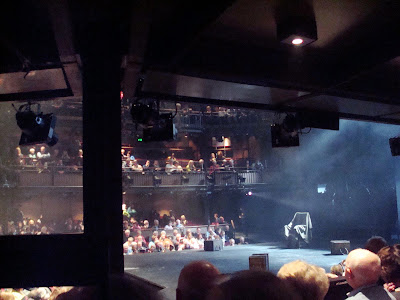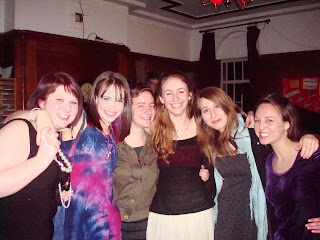I've been getting this question a lot; ostensibly, it is because I have been complaining a lot about my frequent and seemingly-interminable library days. And, as I am nearing the end of another one of those days, it occurs to me that writing about my research is better than writing my research itself. Lo! A blog post is born.
I turned in a paper yesterday that was about The Nursery "Alice", which is a Lewis Carroll work. It was published 25 years after the initial publication of Alice in Wonderland, and it does what it says on the tin: it is a nursery version of Alice, designed to be read to children aged 0 to 5. Its publication history is quite complicated--for example, Carroll condemned the entire first print run as "too gaudy" and condemned them for sale in America--and it took a long while for this adaptation to come to fruition. The text itself is absolutely adorable: it often references its own illustrations ("Don't you see how [the rabbit's] trembling? Just shake the book a little, from side to side, and you'll soon see him tremble.") and it includes some lovely random stories. Anyway, my essay--which is for my bibliography and theories of text class, and is therefore not a literary essay but a biblipgraphical one--is about this work's publication history and also about some issues related to self-adaptation: the importance of illustration, the author's willingness to toy with usual conventions regarding physical publication, narrative structures that lend the tale to being spoken aloud rather than read silently.
And now! I am working on a quite different vein. This current paper is for my "Science, Philosophy, and Popular Culture, 1880-1910" class. I'm writing about Sherlock Holmes, which is fun. When Doyle was writing, Darwinism was a big frickin' deal, and it was seen as being solely about competition. Therefore, when the concept of symbiosis (for those of you who only vaguely remember high school biology, that's when two (or more) organisms live with, in, or on each other for the benefit of one or both constituent members) was coined in 1877, it was quickly defined (read: simplified) by popular culture as being in opposition to Darwinism: one was about competition for the goal of survival, the other dealt with cooperation for mutual benefit. So I'm writing about how Sherlock Holmes and Professor Moriarty have a relationship best characterised by pop-Darwinism--they compete constantly and they know that the end is death for one of them; in so doing, they 'evolve' in the sense that they both sharpen their skills. Meanwhile, Holmes' relationship with Watson (why yes it is difficult not to make references to the fact that they were probably totally gay, because they totally were) is one that mirrors symbiosis: they live together and work together. They provide various services for one another; they need each other. Most importantly, Homes/Watson is as opposed to Holmes/Moriarty as symbiosis was to natural selection, though each relationship is a means for the characters to evolve--rather, to grow.
So that's what's up! And now the library is closing in fifteen minutes, and a man wearing the loudest shoes on the planet is scurrying about closing all of the windows--so I ought to sign out.
Just thought I'd share. For the, you know, one person who might be interested in my boring essays.
xx
Tuesday, March 22, 2011
"what are you writing about?"
Posted by Corinne at 6:47 PM 6 comments
Sunday, March 20, 2011
spring!
Actually, spring in Oxford came to me quite suddenly. In the midst of long library days, it's easy to ignore the ten minutes to and from the Bodleian that I usually spend head down, earphones in, powering through the usual wind and cold. All of a sudden, I turn a corner in a passage that I walk every day--and I almost run into a gigantic white cherry-blossom tree. It is cloud-like, voluminous--and has blossomed, apparently, overnight.
And that's when warmth and sunlight occurred to me, too. Either the elements conspired to become spring all at the same moment (possibly with the sole purpose of confusing me), or I've been walking around for two weeks unaware of my surroundings.
At any rate, it's brilliant. Come Thursday, I'll be free, for a little while anyway, and that freedom may well take the form of laying in the grass.
Posted by Corinne at 6:22 PM 0 comments
Saturday, March 19, 2011
things to do today
Attend a fabulous (and relatively early-morning) lecture given by my lovely friend Christopher on Meister Eckhart. Fail to understand much of it. Feel, therefore, simultaneously good and bad about self.
Eat a delicious sandwich with Rowena, despite it being ten in the morning and not, therefore, optimum sandwich time.
Brainstorm reasons not to go to the Bodleian.
Go to the Bodleian despite brain's best objections.
Enjoy a brief and humorous three act play written by my dear (and absolutely insane) friend Emily. Try not to giggle too loudly; disregard own lack of success at this last goal.
Nearly perish at the sadistic whim of a hell bent, Bodleian-dwelling bumblebee.
Scrutinize every movement of said bumblebee for the next thirty minutes, just in case it's picked up my scent.
Write blog post. (edited to reflect subsequent success)
Edit my Alice essay.
Posted by Corinne at 12:26 PM 0 comments
Friday, March 18, 2011
fools that will laugh on earth must weep in hell: doctor faustus
Posted by Corinne at 12:55 AM 1 comments
Labels: the arts
Thursday, March 17, 2011
i wrote a poem in the library. it is not a good poem, but it is better than working.
Did they refuse to leave their manuscripts?
Posted by Corinne at 1:54 PM 1 comments
Wednesday, March 16, 2011
a typical friday night
 Often enough--actually, nearly every week--something specific is going on in the JCR. Above-pictured is our hospital-themed bop: some people dressed up, and there were shots of tasty things in test tubes and syringes littering the tables of the JCR.
Often enough--actually, nearly every week--something specific is going on in the JCR. Above-pictured is our hospital-themed bop: some people dressed up, and there were shots of tasty things in test tubes and syringes littering the tables of the JCR.Many of us--hideously uninteresting and getting old--leave quite early, but it's still a fun night. And the best thing is, it'll happen again next week! The only downside is that I am quickly running out of pretty dresses, because they've seen me in all of these at least twice...
Posted by Corinne at 12:01 PM 0 comments
Labels: college, food and drink
Friday, March 11, 2011
king lear
***
In last night's Royal Shakespeare Company's production of King Lear, for which we travelled by train to Stratford-upon-Avon, this haunting scene left us shivering alongside Lear at intermission. The show itself was gorgeous, with only a few negatives (the second half, perhaps too indulgent of Lear's crazy-speeches, dragged; Cordelia was only so-so) to mar our enjoyment.
 It made a lot of interesting choices: some characters' costumes looked positively medieval, particularly in the beginning, but they slowly meandered into modernity. By the last scene, most of the men were wearing World War I-style uniforms; instead of the big battle, the lights simply dropped and massive gunfire could be heard. Greg Hicks' now-famed performance of Lear was as brilliant as I've been hearing. Goneril and Regan were notably good as well: Regan had a red-lipped, gorgeous sort of vindictiveness about her, while Goneril was actually quite sympathetic: sad, infirm, failing. The set, with its ever-discordant jumble of the old and the new, added a lot to the show. The unpredictable lighting (a chandelier in this scene; sparking industrial halogen ceiling-fixtures that look like they could fall at any second in that one) kept the audience aware--Brecht-like?--of the show's artificiality, and the blocking made good use of the thrust stage. All in all, a successful performance.
It made a lot of interesting choices: some characters' costumes looked positively medieval, particularly in the beginning, but they slowly meandered into modernity. By the last scene, most of the men were wearing World War I-style uniforms; instead of the big battle, the lights simply dropped and massive gunfire could be heard. Greg Hicks' now-famed performance of Lear was as brilliant as I've been hearing. Goneril and Regan were notably good as well: Regan had a red-lipped, gorgeous sort of vindictiveness about her, while Goneril was actually quite sympathetic: sad, infirm, failing. The set, with its ever-discordant jumble of the old and the new, added a lot to the show. The unpredictable lighting (a chandelier in this scene; sparking industrial halogen ceiling-fixtures that look like they could fall at any second in that one) kept the audience aware--Brecht-like?--of the show's artificiality, and the blocking made good use of the thrust stage. All in all, a successful performance.We also got to look around Stratford itself for awhile. It's a cute little town on the river whose only claim to interest, of course, is good old Bill, whose home (pictured above) we visited excitedly. Consequently, every cafe and pub and shopping-centre and street name seems to have some relation to the Bard--and some of them are quite silly.
Along the river, we stopped to muse at the statue of the man himself: he sits atop a high throne, and sculptural renderings of Prince Hal, Falstaff, Lady Macbeth, and Hamlet surround him in death as they did in life.
In fact, I even got a little up-close-and-personal with Falstaff. My eyes are up here, buddy.
All in all, Robby and Kelly and Megan and I--three of us in the English M.St programme, and one amateur enthusiast--had a lovely time in Stratford, and the show definitely lived up to its expectations. Hicks' Lear is not one to miss: students in and around Oxford, do yourself a favour and pick up a £5 ticket for this spectacular performance.
Posted by Corinne at 6:20 PM 2 comments
Labels: the arts, touristy fun, UK chums
Monday, March 7, 2011
why the JCR is awesome
I've realised, as of late, that my blog's aim hasn't involved the teach-people-about-Oxford element that some of my friends' blogs do. In the midst of the part of term where I do nothing interesting--unless you're willing to consider sitting, immobile, for ten hours out of every day in the Bodleian interesting, in which case fair enough--I have to stretch a little bit for a blog post.
Anyway, stuff happens in the JCR. A couple of times a day people gather to drink tea and chat; the college's bar is situated in the JCR, meaning that it becomes popular after dark; most Fridays, you'll find people dancing and drinking and wearing silly costumes of some variety up there. Every college has one, and every one is different. Think Harry Potter, when you finally get to read about other Houses' common rooms? Gryffindor's is all plush and cosy; Ravenclaw's is austere and impressive; Slytherin's is like a dungeon. College JCRs, and college bars, are like that too. Ours isn't the biggest or the most elaborately decorated, but it feels more like home than many of the others I've seen.
My friends at other colleges are surprised by my hanging out with "JCR people"--with undergraduates. Like US undergrads, they're mostly between 18 and 21 (though a BA here generally requires three years, not four), meaning that they're a couple of years younger than I am. Fortunately, Regent's is small enough that those divisions lose a certain amount of meaning: why wouldn't we come to the bops and the parties and the socials?
Anyway. It's almost time for Brew, which means I'm headed up to the JCR to get a muffin--right before I go back to the library for the rest of my life.
Posted by Corinne at 11:03 AM 2 comments
Labels: college







